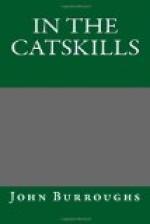One of the leading songsters in this choir of the old Barkpeeling is the purple finch or linnet. He sits somewhat apart, usually on a dead hemlock, and warbles most exquisitely. He is one of our finest songsters, and stands at the head of the finches, as the hermit at the head of the thrushes. His song approaches an ecstasy, and, with the exception of the winter wren’s, is the most rapid and copious strain to be heard in these woods. It is quite destitute of the trills and the liquid, silvery, bubbling notes that characterize the wren’s; but there runs through it a round, richly modulated whistle, very sweet and very pleasing. The call of the robin is brought in at a certain point with marked effect, and, throughout, the variety is so great and the strain so rapid that the impression is as of two or three birds singing at the same time. He is not common here, and I only find him in these or similar woods. His color is peculiar, and looks as if it might have been imparted by dipping a brown bird in diluted pokeberry juice. Two or three more dippings would have made the purple complete. The female is the color of the song sparrow, a little larger, with heavier beak, and tail much more forked.
In a little opening quite free from brush and trees, I step down to bathe my hands in the brook, when a small, light slate-colored bird flutters out of the bank, not three feet from my head, as I stoop down, and, as if severely lamed or injured, flutters through the grass and into the nearest bush. As I do not follow, but remain near the nest, she chips sharply, which brings the male, and I see it is the speckled Canada warbler. I find no authority in the books for this bird to build upon the ground, yet here is the nest, made chiefly of dry grass, set in a slight excavation in the bank not two feet from the water, and looking a little perilous to anything but ducklings or sandpipers. There are two young birds and one little speckled egg just pipped. But how is this? what mystery is here? One nestling is much larger than the other, monopolizes most of the nest, and lifts its open mouth far above that of its companion, though obviously both are of the same age, not more than a day old. Ah! I see; the old trick of the cow bunting, with a stinging human significance. Taking the interloper by the nape of the neck, I deliberately drop it into the water, but not without a pang, as I see its naked form, convulsed with chills, float downstream. Cruel? So is Nature cruel. I take one life to save two. In less than two days this pot-bellied intruder would have caused the death of the two rightful occupants of the nest; so I step in and turn things into their proper channel again.




